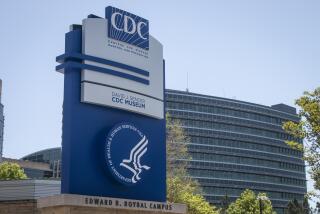Funds for DNA Testing of Criminals Are Diverted
- Share via
WASHINGTON — The Justice Department has set aside plans to offer $750,000 in grant money for DNA testing of convicted criminals to determine whether they are indeed guilty. Instead, the money will be used to help identify victims of the Sept. 11 terrorist attacks, officials said Wednesday.
“There’s nothing sinister here,” said Charles Miller, a Justice Department spokesman. “What happened was that [Sept. 11] came along” and the funds were redirected.
The strategy for selected DNA testing of prisoners had its roots during the Clinton administration, when the process exonerated individuals who had spent years in prison for crimes they did not commit. While some law enforcement officials have expressed concern that DNA testing encourages wasteful appeals, many others have supported the approach as a way to erase doubt about convictions.
While no one criticized the new use of the money, civil liberties advocates complained that the Justice Department’s action could leave at least some indigent convicts without the resources to use DNA in a bid to prove their innocence. A DNA test compares biological evidence left at a crime scene, such as blood or semen, with physical evidence from a suspect, in the process affirming a person’s guilt or calling it into question.
Advocates for the accused maintain that DNA evidence has cast doubt on dozens of convictions since it came into widespread use about 10 years ago.
“It’s safe to say that if you take away $750,000 that was earmarked, there’s going to be some people who would have taken the test that would have proved them innocent,” said John Pray, a professor at the University of Wisconsin Law School in Madison.
Pray said that the most basic DNA test of an existing sample might cost just $100, but more complex testing that may require further analysis of evidence can run into the thousands of dollars. A growing number of states have started to make such funds available to those convicts who can establish a persuasive reason to conduct the testing.
In August, Atty. Gen. John Ashcroft announced a $30-million initiative to help ease a logjam of DNA requests at various stages of the criminal justice pipeline, including crime scene investigations, as well as to collect samples from federal inmates. Separately, the National Institute of Justice, a research arm of the Justice Department, was preparing to increase a $500,000 DNA program for prisoners to $750,000, providing a new source of grant money available to prosecutors seeking to confirm the guilt of convicts.
At the time, Ashcroft emerged as a champion of DNA testing, telling reporters: “DNA can operate as a kind of truth machine, ensuring justice by identifying the guilty and clearing the innocent. Backlogs of unanalyzed DNA samples and unacceptable delays in analysis of crime scene DNA evidence are preventing the full utilization of this remarkable technology.”
In particular, convicts from the 1970s and 1980s may have never had the opportunity to prove their innocence through DNA testing, their advocates said Wednesday.
But Justice Department officials said Wednesday that the events of Sept. 11 created a new need for the $750,000, which will be used to help identify victims of the terrorist attacks and to fund research on identification of mass casualties.
The notion of diverting the DNA funds from their original goal raised eyebrows Wednesday among some who have watched the Justice Department grapple with its policy on DNA. The cutback was first reported in USA Today.
“It sounds a little fishy,” said Jerry Lyell, a defense attorney in Arlington, Va. “To hear them cutting back, especially such a small amount comparatively, . . . might suggest that their hearts weren’t in the right place in the first place.”
Anthony Romero, executive director of the American Civil Liberties Union, said: “The decision to scrap the DNA testing of some inmates is unfortunate. The technology would have increased the public confidence in the legal system and the resources would have been well placed. With all the public doubts about the death penalty and around racial bias in the criminal justice system, we should use every avenue open to us to increase public confidence.”
More to Read
Sign up for Essential California
The most important California stories and recommendations in your inbox every morning.
You may occasionally receive promotional content from the Los Angeles Times.













